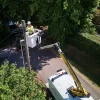INCA Accuses Ofcom of Putting UK Full Fibre Rollout at Risk UPDATE

The Independent Networks Co-operative Association, which represents UK alternative broadband ISP networks, has today warned Ofcom that “more than £25bn worth of investment” to improve the UK’s digital infrastructure “will be directly threatened” if Openreach is allowed to introduce new FTTP wholesale price discounts (Equinox 2).
Just to recap. Openreach are set to introduce a new round of wholesale discounts on their full fibre broadband products from April 2023 (here). The move is intended to help their ISPs stay competitive with newer alternative networks (Summary of UK Full Fibre Builds) and further reduce the price of related packages, which will in turn boost take-up by consumers and aid the move away from copper lines.
As we’ve previously said, the discounts under Equinox 2 are not as dramatic as Equinox 1, with smaller changes to rentals and some reductions in connection charges. Nevertheless, more than a few AltNets view the move as being anticompetitive (here), with CityFibre even going so far as to lodge a Competition Act complaint with the Competition and Markets Authority (CMA) and Ofcom (here).
Advertisement
Openreach’s smaller rivals carry a lot of risk due to being in the earliest stages of investment and build, but many of which have previously enjoyed a market where the operator was traditionally much more expensive. This made it easier for them to grow take-up, attract investment and gain support from ISPs to join alternative wholesale options. But at the same time, they fear that Openreach’s response (more discounts) may be putting all of that at risk.
However, last month saw Ofcom take the “provisional” position not to intervene (here), which the regulator said was because Openreach’s offer is “not anti-competitive and is consistent with the rules we consulted on before introducing them under our market review in 2021.” INCA has now responded to the related consultation and their reaction is much the same as it was last December (here).
Malcolm Corbett, INCA CEO, said:
“The Government’s policy of encouraging competitive investment has been hugely successful with more than £25bn of investment committed to BT’s competitors. Allowing Equinox 2 to be implemented would have a serious negative effect, undermining the investment incentives for altnets of all sizes, across all business models, and would put the UK’s largest privately funded infrastructure programme at risk.
Ofcom’s assessment of the Equinox 2 offer appears to reflect a strong bias to protect BT Openreach’s full fibre business plan and has a complete disregard for the many smaller market entrants and the billions of pounds invested in those networks. This also runs counter to the digital infrastructure policies of the Government, largely being driven by private sector investment, and which underpin the ambitions of the new Department for Infrastructure Science and Technology.
Our message to Ofcom and Government here is quite simple: these ambitions, that can have a transformative impact on the country’s digital landscape, economy and reputation, are being propelled by investment into independent networks. It’s the regulator’s and Government’s responsibility to make decisions that do not jeopardise that. We call on Ofcom to do the right and logical thing and block Equinox 2 from entering the market.”
As well as reversing the decision to allow Equinox 2 to go ahead, INCA also seeks several other changes.
INCA’s Recommendations to Ofcom
➤ In the longer term, BT Openreach should not be allowed to engage in continuous signalling of new offers that are designed to destabilise the market and prevent altnet growth.
➤ To ensure competition in full fibre provision and avoid depriving consumers of choice and value for money, INCA recommends that BT Openreach must not be able to implement schemes that link discounts to loyalty conditions. Such loyalty schemes abuse BT Openreach’s in-built advantage of an existing customer-base of almost totally dependent ISPs on the copper network.
➤ INCA’s response also highlights where it believes Ofcom’s analysis is deficient, incomplete and flawed. For example, the regulator only considers the impact of Equinox 2 on the three largest ISPs and the three largest altnets.
Blocking Openreach from being able to compete on price might seem like a good idea to AltNets, but it’s unlikely to go down well with consumers (particularly if Openreach’s FTTP is your only option today). Lest we forget that the regulator’s analytical framework remains more “concerned with the promotion of competition rather than the protection of competition as under competition law” (Ofcom quote).
Advertisement
As ever, the challenge in all this is with figuring out where to draw the line when trying to balance the vested interest of both sides. Ofcom has allowed Openreach plenty of flexibility to stay competitive, as may seem only fair in such an aggressively competitive market – this is part of the reason why the dominant player opted to invest so much money into FTTP in the first place.
On the flip side, AltNets are much more exposed to the market’s many challenges, such as with high inflation and rising deployment costs. At the same time, it’s harder for newer entrants to attract customers, as they can’t trade off brand familiarity and often won’t be on commercial comparison sites. Some networks get around this by attracting big name ISPs and conducting heavy local advertising, but not everybody can do that.
However, Ofcom have already said that they’re “alive to the concerns” of some market participants that Openreach’s practice of amending its full-fibre prices could act as a barrier to competitors’ entry and expansion in the market. As a result, they’re gathering evidence to decide whether to investigate this matter in more detail, but that won’t change the outcome for Equinox 2.
UPDATE 3:44pm
Advertisement
A spokesperson for Ofcom told ISPreview.co.uk: “We’ll be carefully considering all responses to our consultation before making our final decision.”
Mark is a professional technology writer, IT consultant and computer engineer from Dorset (England), he also founded ISPreview in 1999 and enjoys analysing the latest telecoms and broadband developments. Find me on X (Twitter), Mastodon, Facebook, BlueSky, Threads.net and Linkedin.
« Ofcom UK Clamps Down on Misleading Uses of “Fibre” Broadband UPDATE2






















































Surely E2 discount still makes them more expensive than Altnets currently? basically the complaint to me sounds like they can’t raise prices in future without OR being competitive, or they want a larger difference between Altnet and OR.
You would think they’d sell on other benefits in that case, better upload, smaller/more dynamic ISPs, SLA on repairs etc.
I think the altnet pricing is only possible because of the VC funding that a lot of these network builders enjoy, and they correctly recognise that they cannot hold prices that low once growth has flatted out.
Openreach cutting prices down meanwhile BT fleecing their customers with increases. Makes perfect sense
Why do INCA continue to use the name BT Openreach?
Because Openreach is a company wholly owned by BT Group plc.
And the network assets are still owned by BT plc, not by Openreach.
Yes but the company has not been known as BT Openreach for a while now….
And, quite possibly, since as an Openreach customer you still pay BT not Openreach.
I expect it is just a constant drip-feed dig at Ofcom.
It has never been called BT Openreach. It’s a deliberate used mantra designed to undermine the regulator.
Once again I’m left angry at an Altnet for insisting that I have to pay extra (no competition available to me, OR are the only fibre provider and realistically always will be due to being so rural) just because they don’t want OR competing with them in towns and cities.
Tough luck I say, learn to compete.
Ironically if they were able to compete with OR, you might have them as an option and wouldn’t be moaning about it on here, enjoying your cheaper broadband.
Oh well.
Ex telecom engineer. Many do have a superior product like symmetric and xgs-pon right now, and some very good UK based support, also cheaper by many.
So BT can take all the infrastructure stuff cheap from the tax payer and that was dandy? Let’s not forget BT selling PIA not giving it to ALTNETS.
My money is going to an ALTNET on principal.
The INCA complaint can be summarised like this:
OFCOM, Altnets are relying on you to prevent BT/Openreach from competing with them, as the Altnet City based investors would like a return on their investment ASAP, rather than waiting for natural organic growth.
We realise that BT is one of the few large listed UK service providers remaining, and by holding them down it ensures another UK listed company will be weakened to help out private non listed companies; We also realise it sends the message that the UK authorities don’t like its FTSE listed Blue Chip companies.
In my opinion, the INCA and Altnets should stop whining and get on with competing, if they’ve got a superior product, at the right price point as they claim, then they shouldn’t have a problem; They should be able to build their businesses without relying on OFCOM nobbling BT/Openreach.
You can be 100% sure that IF BT/Openreach ever does manage to rid the market of the altnets, they will reverse their tune very quickly on how expensive it is to maintain and operate the access network.
There is no point arguing with this clown. His post should be flagged for misleading given he has a financial interest in BT. Absolute joke.
I’d suggest you’re the Clown John, instead of arguing against my opinion you just throw insults. Maybe you should explain why you hate BT/Openreach, could it be you have your own vested interest?
I admit to being a BT shareholder and proud to invest in a UK listed company. If the Government had more UK industry focused policies, maybe companies like ARM Holdings wouldn’t list in the US. As far as foreign investment in the UK, they can keep their money if they’re relying on the regulatory authorities a leg up over our home incumbents.
BT and its obsession with copper originally before competition forced them to change, is an embarrassment to be called British.
The old nationalistic thing won’t wash. It held this country back for years sweating copper because it chose fttc and didn’t want to use existing poles for fibre to home originally which meant costing was pushed up for trenching and ducting. They also didn’t want to take more staff on, train them for fttp. They’ve finally done these.
“The old nationalistic thing won’t wash. It held this country back for years sweating copper because it chose fttc”
Anonymous, the most likely reason BT/Openreach didn’t invest in FTTP early on, is due to the regulatory environment. OFCOM have been pretty good at forcing BT to share its assets, why invest so that other CP’s can benefit? Would you build a house if you were told you had to share it with unlimited others, but only able to charge them a minimal rent? I thought not.
BT, as it was then, didn’t invest in FTTP because of the desire to invest in TV – where did that get them? Source: Peter Cochrane who put the case to the Board to go straight to FTTP and not sweat the copper asset. He was supported by the CFO who saw the savings in running costs from a full fibre network. The Board turned them down and chose TV which was just money down the drain.
BT had a good head start with state owned infrastructure throughout the UK except for Hull and was obtained cheaply. Most of that still in operation like poles, ducts, pits, exchanges etc.
So why not give help to ALTNETS for competition seeing as they are being charged for it anyway?
I remember the BT fans wanting VM to open up their ducts and cabinets crying because they didn’t want to at the time. They had privately funded their infrastructure too when different cable companies before merging.
No BT had their chance and told everyone that FTTC was all they needed as “superfast” and then they blew money into BT Sport. Incompetent.
The UK can’t go full on ‘UK first’ in its trade policies. We aren’t big enough, don’t have the market, don’t have the resources.
China, the EU and the USA set the rules. We rely on all three, they don’t rely on us.
We are strangling one of our major exports, education, in an attempt to pacify xenophobes. Things we invent we fail to invest in and they’re commercialised elsewhere, though those are steadily falling as we left trans-European research and education programs.
We had a place at the big table but decided we wanted a smaller one to ourselves. Result being we’re a rule taker with no ability to significantly retaliate to protectionism or initiate it ourselves without harm to our economy. We ensured that when ‘we’ decided to be the only part of Western Europe neither in the European Economic Area or the European Free Trade Agreement.
The only reason BT is still on the FTSE and a British company is the government. Its entire enterprise cost and liabilities are pocket change that fell down the sofa to some.
From BT’s top 10 investors alone 44.65% of the company is owned outside the UK. While it’s certainly more British than Harrods or Canary Wharf it’s debatable whether it’s a British company. ARM is owned by Softbank. They bought it when Sterling plummeted as we took back control. It’s listed wherever they want to list it.
The asset stripping and diminishing of the UK DHL will carry on, and at some point the bills for our government’s gross ineptitude will come due, and we’ll realise we sold off or, will of the people, rejected the means to generate the money to pay them.
So my thanks to your cohort for the wonderful legacy. The nation will be paying for it for generations.
I’m getting tired of hearing companies/organisations complaining about Openreach cutting their prices.
If you can’t stand the heat then get out of the kitchen.
Rather than complaining and trying to keep prices artificially inflated (and preventing end users from enjoying cheaper internet access) they should concentrate on making their products more competitive and more attractable.
It’s not Openreach’s fault if some of the alnets haven’t done their maths and are following a business plan that is simply not sustainable.
What we are talking about here though is a very dominant operator adopting predatory pricing techniques to try and get the altnets to withdraw from the market. After which, they would simply increase their prices again.
Absolutely baffling that after moaning for literal decades about the lack of competition forcing Openreach to develop its infrastructure, now we have an actual competitive market everyone wants the alt nets to go bankrupt and go back to the dark ages.
May as well just let Labour nationalise it and be done with it if that’s your attitude.
Oh please. There’s really no danger of Infracapital, Goldman Sachs and the numerous hedge funds and sovereign wealth funds – all of which use the ‘plucky altnets’ as their front – going bankrupt.
John speaks sense here. Bt only wants to undercut to snub out competition. It really isn’t the consumer champion. Never has been. It hates other providers doing symmetric, particularly residential.
Sure – whereas the gigantic investment vehicles mentioned above really care about consumers. Do me a favour.
Alex. Gotta say, but the ALTNET getting my money does what I want. Symmetric speeds, good customer support based in UK, fantastic price and using xgs-pon right now, not a trial then a pilot then roll out programme years later.
So yeah, for me, they pretty much work fine…
And no mid contract price rises and no rpi or cpi plus additional 3.9% and no exit penalty free clauses removed.
Good for you. Symmetric speeds aren’t a big deal for most people though. They’re niche. Many of the big players have UK-only support now too, whilst prices across the board are very competitive, despite inflation. My point was there’s no chance of Infracapital going bankrupt because Openreach are competing on price. People should really stop peddling this weird notion that the altnets are feeble, oppressed, embryos that need more protection. They got protection and encouragement in the WFTMR so they need to get on with it. This is what Greg Mesch said at the time:
“This regulation will promote and protect the infrastructure competition that is enabling Britain to go full speed ahead for Full Fibre. Ofcom’s Market Review is the culmination of its strategy, using competition to drive Full Fibre investment and nationwide coverage.
It will inspire confidence and unleash a decade of innovation and investment from competitors like CityFibre, rebalancing market share away from incumbents and driving better services and prices for wholesale customers and consumers.”
INCA have massively misunderstood the Offer, what they have failed to understand is that ISPs can use the new openreach offer without any commitments. the only rule is that if they are ordering services from Openreach 80% of there order mix must be FTTP if the premises can get it. there is nothing stopping them from ordering FTTP from an alnet while still retaining Equinox pricing levels for the FTTP services they have with openreach, providing they do not dilute there new order mix.